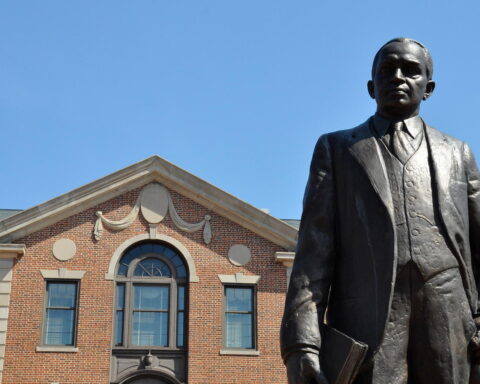By Quiana Shepard
North Carolina Central University has been awarded $1.1 million to lead other historically Black colleges and universities (HBCUs), some minority-serving institutions and local communities in a three-year project fostering Geographic Information Systems (GIS) and open-data-science support for faculty and student researchers.
The award to NCCU is being supported by the National Science Foundation Directorate for Education and Human Resources and the Office of Advanced Cyberinfrastructure, and will enable NCCU to have an increased presence in the burgeoning field of GIS, a computer system for capturing, storing, checking and displaying data related to positions on Earth’s surface.
GIS can show different data on maps – including streets, buildings and vegetation – while assisting in hazard mitigation, future planning, air pollution and control, oil spills and the management of natural disasters, forest fires and other calamities.
While larger institutions in the region have dedicated staff who serve as geospatial librarians and manage and catalogue GIS data assets for faculty, at NCCU, that responsibility rests chiefly with Tim Mulrooney, Ph.D., a professor in the Department of Environmental Earth and Geospatial Sciences. Mulrooney is co-principal investigator on the grant with Gordana Vlahovic, Ph.D., department chair and professor, and Christopher McGinn, Ph.D., professor.
“If someone in history or public administration or criminal justice wants to do some mapping, they call me,” Mulrooney said. “We’re trying to develop the resources and the capacity to serve all disciplines across campus, and it’s a lot for one or two people to handle. This grant will expand our capabilities to adequately capture and store data because it will enable more people on campus to be involved in this important work.”
Part of the money provided by NSF will be used to fund a post-doctoral researcher, 45 undergraduate students and a few graduate students to work on developing a searchable, data infrastructure on which the university can store socially and environmentally relevant data.
The undergraduates won’t create or catalogue data but instead will work on projects based on existing research and present their data at research forums, Mulrooney, said.
NCCU already conducts socially responsible research and now will be able to develop the necessary infrastructure for data on subjects including COVID-19, voting patterns, food insecurity and health inequities.
“We’re providing training resources in a centralized location to help researchers in the community facilitate data-driven decision making,” Mulrooney said. “We make decisions based on what the data tell us, so equipping people with the data resources and training is the seminal element of this grant.
The work will begin in January 2023, and in the interim, Mulrooney has begun notifying sponsor programs of the grant, looking for a post-doctoral student and reaching out to colleagues across campus to identify and recommend undergraduate students – 15 annually for three years – to assist on the project. Students will come from various departments, including criminal justice, kinesiology and recreation administration and public administration, he said.
Chancellor Johnson O. Akinleye praised Mulrooney, Vlahovic and McGinn for securing the grant, saying it will enable faculty and students to get more mileage out of the outstanding research being done on campus.
“Geographic information systems is an expanding and critically important field, and I’m grateful for our three outstanding faculty members who are dedicated to broadening North Carolina Central University’s footprint in this evolving discipline,” Akinleye said. “This project will also provide our student scholars with engagement opportunities to transform their communities, a key tenet of the university’s Eagle Promise, which provides tools to champion their future.”





